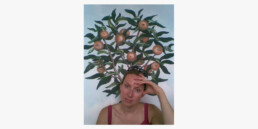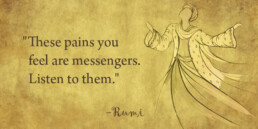Missing My Stop
A guest blog by Abigail Gray.
In my second year of Deputy Headship, on the first day of the Easter Holidays, I found a lump in my daughter’s left thigh. She was 4 years old. In the days that followed, after a succession of hospital visits, scans and a biopsy we would discover that it was malignant.
I was sitting on my bed at home when I took the consultants call. I watched my reflection change in the wardrobe mirror as he spoke. It was one of those grey days in Spring, the sky had been threatening rain all morning. I remember looking around the room and feeling complete confusion, how could everything look the same and be so different?
I’d love to say that what happened next was a blur but it’s not. The memories are chiselled into me. From the moment I put down the phone I experienced a kind of separation, two parallel reactions: one internal and one external. She was in the next room recovering from the operation. I had to get on with the day, dress her, make lunch, we had to get to the hospital and of course I’d have to call her father and then my parents to break the news. I chose to swallow the shock, my tears and save the anguish until later.
Growing up in Bermondsey had taught me that there were few qualities prized more highly than resilience and discretion, especially amongst women. My grandmother was the wife of a docker who raised 6 children in a council flat; she survived war, poverty and breast cancer. She was a stoic, with beautifully set hair and quiet authority. The astonishing women who raised me endured their generous helping of suffering in quiet dignity. How could I be any different?
At work I’d witnessed desperate things. I’d worked with terminally ill children, children abused and abusers, children looked after who most certainly had not been ‘looked after’, children who had slipped through all the massive holes in all the nets to find themselves without options, hope or indeed literacy. Consequently, I found almost no space for my own anger or grief about my daughter’s illness. I couldn’t let myself feel it. I couldn’t ask for help. In fact, I used my work to avoid it.
Not for the first time, as work had long been a refuge from the acute anxiety that had plagued me from infancy. It was easy to translate this into a positive, this ‘work ethic’ had taken me from TA to Deputy Headship in less than 10 years. There were so many great names for it. People talked about my passion & drive, my focus & commitment. The fact was work was my Prozac. It was my salvation. Not the kind of salvation that comes in a haze of warm light and brings peace but the kind that keeps you fighting another day, crawling along, like the last zombie in the movie.
I found the daunting thing about childhood cancer was not just finding a way through the actual illness but finding a way to live in the spaces between. Watching and waiting was such a big part of those early years. Every childhood scrape and illness promoted a deep-seated anxiety in me. In those moments, I often felt completely alone and crushed by the responsibility. I don’t think I realised how much energy it took to reconcile my love of being a mum and the ever present, doom-laden presence of ‘the cancer’.
As my blood pressure started to rise, I took the medication and changed nothing. I buried myself in work all day. In the evening I’d be with my daughter, lay next to her each night and stroke her head until she was asleep. Afterwards, I’d pour myself a pretty huge glass of wine, cry and write.
I actually wanted the people around me to think I was coping. I was convinced that the satisfaction of doing right by them would ultimately sustain me. I believed that I’d make it to the other side. When, in fact, there was no other side.
10 years later I hit the wall with literally nothing left in the tank. Shredded, sleepless and exhausted while being paid the highest salary of my life in a job I thought I loved. The realisation was sudden, like looking up from your book on a train journey and realising you missed your stop. What else is there to do but get off?
It wasn’t therapy that helped me, it was habit change. I was forced to acknowledge my needs and attend to them. More than anything, I just needed to sleep. After that I took the revolutionary step of describing what I wanted my life to look like. Then it was just planning how to get there. Personal and professional goals intertwined for the first time.
I realise now that there are different kinds of courage. Just because you have one kind doesn’t mean you have another. I was afraid to imagine what I really wanted, to listen to myself, to say no, to ask for help. It’s my daily challenge, a habit that I practice. Like Adriene Mishler says at the beginning of her yoga classes, ‘The hardest part is showing up.’
Postscript
I’m very happy to report that my daughter is now 23 and overseas, embarking on the next exciting stage of her life. I am deeply and daily grateful to be her mum. She is phenomenal. We are, of course, forever indebted to the wonderful doctors and nurses at both Guy’s and The Royal Marsden Hospitals.
My heart goes out to all the mums and dads that face into this struggle, I wish you all the love and strength in the world.
Leadership Unmasked
A guest blog by Aurora Reid.
It’s time I wrote about my own mental health…. Actually, I started this blog in December so it’s really time I did. I wrote those first words at the end of a dark rainy term in London and I finish it in sunny June in a very different emotional state. I have made choices, to move on from settings and roles that don’t serve me and prioritise my own wellbeing. Nonetheless, the same question is still permeating. How do I express my own vulnerability as a leader, whilst keeping myself and others safe? How do I talk about my mental health in a way that frees others and doesn’t set unrealistic standards but doesn’t get me labelled as weak, lacking resilience or ineffective in some way?
Having taken a year out to prioritise my physical and mental health, 6am rainy starts out of Waterloo station and days of running (again) from meetings to class to duties to paperwork to conversations with families or training for staff and then home again (in the dark) came as a real shock. My alarm system flares up. Sometimes I can’t sleep, sometimes I can’t get up, sometimes I can’t stop thinking, sometimes I can’t stop crying, sometimes I don’t have any motivation to do anything at all except look and my phone and eat junk. There’s plenty of labels you could put on me and yes, I definitely need support in these low moments but ultimately it’s not my system that’s broken. I am having a perfectly health response to a dysfunctional education system and world.
It feels as though staff and students are more dysregulated than ever. School refusal, teacher attrition and mental health rates are through the roof. The response? More pressure, both from below and above. Everyone seems stretched to breaking point. This affects me, no matter how much meditation I do or books I write on the subject, I am first and foremost human. The research on interpersonal resonance and coregulation confirms what I know instinctively. That is, if I am in an unhealthy environment, I will feel ill.
Before I would’ve masked it, “put a brave face on” to “stay professional” but having written a book positing a mindful approach leadership, that recognises our limits as leaders, I feel a duty to talk about it. With my teams and more publicly. How else are we going to destigmatise mental ill health? How will we be able to recognise our ups and down as normal or feel permission to ask for help when we need it, if it’s not modelled? If people don’t first tread the path for us?
But as a leader it is really freaking scary. We are supposed to be the container, to have broad shoulders, to be able to hold people and so if we signal to the teams that we lead that we are not okay won’t they feel deeply unsafe themselves? Perhaps. It depends on the culture you have in your organisation. There are plenty of environments where it’s not completely safe to be vulnerable (in fact the internet where this blog is going not least). Nonetheless, it will take people speaking out to change those cultures. In fact, to paraphrase Margaret Mead, that’s the only thing that ever will.
Yes, some bosses will see you as weak and yes, some insecure members of the team may feel at sea if you are not completely solid, one hundred percent of the time. However, if you don’t make space for yourself now it will be a hell of a lot worse later down the line. What is more, for most, demystifying yourself as a leader actually makes you more approachable and the path to leadership look more attainable (because people see that you are not superhuman). Perhaps, most of all though, by modelling self-knowledge and self-care you make space for others to do so for themselves. In time hopefully this will lead to the kind of culture change that means that not so many people will need to break in the first place. If we were to start from a place of true inclusion, one in which we prioritise making our schools emotionally healthy places where everyone (including staff, including leaders) can break a little when they need too, then no one will ever have to truly break.
Learning to Unlearn
This blog is reproduced here with permission.
Written by Aini Butt on her blog Aini's Reflections on 9th June 2022.
“Why do you do this to yourself?” my friend laughed.
It had been a painstakingly slow start to another piece of art as I had spent over an hour calculating where each letter of the Quranic quote would start and end. Anything less than perfect wouldn’t be right, I kept telling myself every time I had to start all over again. This was my first attempt at Arabic calligraphy on a large canvas and I couldn’t let myself down. During the several hours working on the art, I kept coming back to the question, “Why do you do this to yourself?” This suggests that it is my choice and within my control to change this thought that anything less than perfect would not be acceptable. If this were to be true then surely it is just a matter of unlearning this belief?One thought led to another; a reflective process was set in motion.
Like a mirror that reflects everything, the inner reflection exposed parts of me that I have been trying to filter out. One of the most important and most difficult things to accept was how control and emotional manipulation had changed the younger me and her perspective on life and what success truly meant. If this were the case than ‘finding myself’ was not going to be about return to who I was before. It would require a deeper exploration of the emotions to understand the values and core beliefs underpinning those thoughts and behaviours that allowed me to stay in a place where I had lost myself. Therefore, it was not about learning new ways of life, but recognising those beliefs and habits that I would have to unlearn to be at peace with myself and finally living my motto to ‘Bloom Unapologetically’.
As I learnt at the beginning of my reflective writing journey two years ago, unconditional loyalty and blind love were one of the core beliefs that did not serve me well for almost fifteen years. Slowly unpicking where and when this belief had been ingrained and became a core value, I realised that this was just the tip of the iceberg of generational curses. We are often brought up with set of core values. Some are taught verbally and silently reinforced through the witnessing and practising of daily habits while some are formed as result of a lived experience.
One habit that I am slowly learning to change and avail to my advantage rather than letting it become a self-sabotaging behaviour is ‘over-thinking’. To this day, I do not like to call anyone (or myself) an overthinker as it has such negative connotations. It was after a chat with a friend who was struggling with ‘over-thinking’ that I started digging deeper. I have often beaten myself up for being an “over-thinker” and I have played conversations and situations over and over again in my head until I could picture the catastrophised version. I was taught to always think of the best and worst outcome as it would allow me to make informed decisions, which served me well for several years. However, this same habit ended up feeding the distorted reality following on from living with coercive control and emotional manipulation for over a decade. Where I had silenced my inner voice for so long, having the ability to listen to my thoughts and feelings without distortion gave me a new sense of freedom.
However, I had to attune my listening skills and adapt by unlearning the habit of thinking of every possible (often disastrous) scenario. Although unlearning of habits ingrained over the years does not happen overnight, it was nothing short of an epiphany when I was able to recognise its origin. It was during one of my ‘over-thinking’ cycles, which I prefer to call self-reflections, that it finally hit me! Visualising the catastrophised outcomes allowed me to create a mental and emotional comfort zone with boundaries to safeguard me from further harm. Recognising the hold my past had over my present was painful, but ‘These pains you feel are messengers. Listen to them.” Rumi’s pearls of wisdom had never made more sense than today when I could feel the pain and its hidden message: forgive yourself! Forgive yourself for those habits that were merely a survival mechanism- your mind and heart’s attempt at safeguarding you at all cost.
The truth was that the emotions were merely a messenger and it became even harder when the emotions were in direct conflict with each other. If I didn’t want to continue living my life in survival mode, I had no other option than to unlearn this habit.
Almost two years on and it has been a journey far from easy and I now accept that I will be a work in progress for as long as I continue to strive for a better version of myself.




